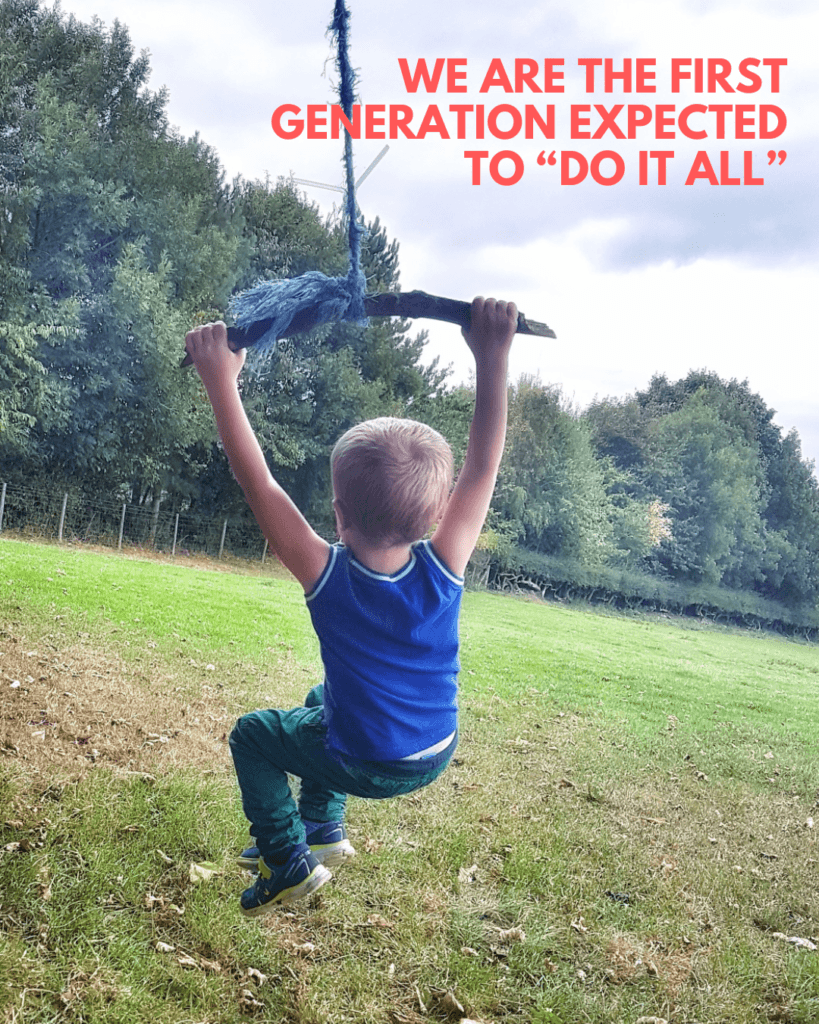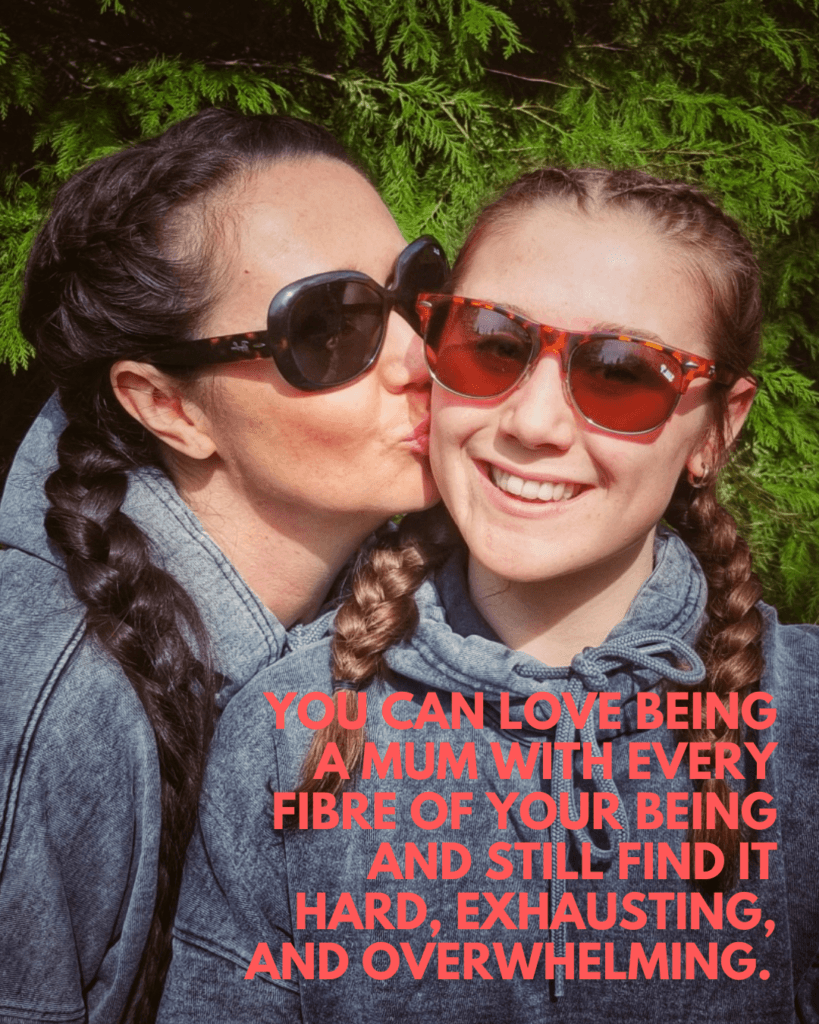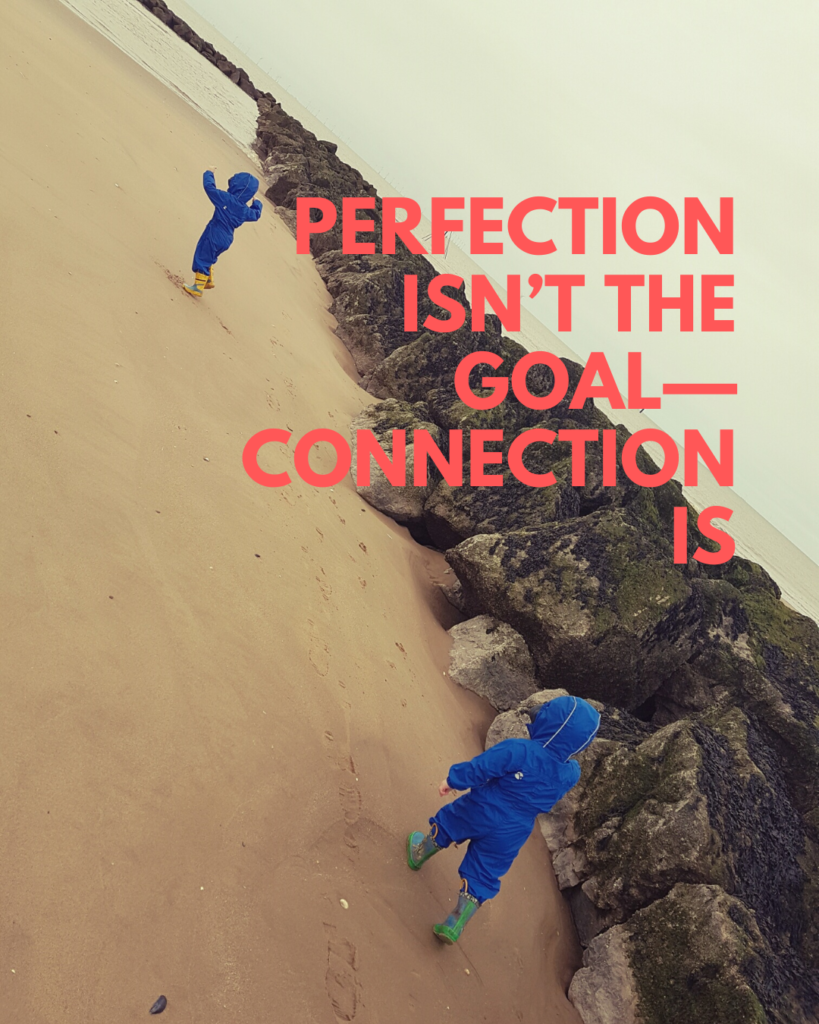Modern Motherhood is the biggest contradiction of our time. We are more informed, more intentional, and more resourced than any generation before us, yet somehow, we feel more inadequate, burned out, and unfulfilled than ever.
We read the books. We follow the experts. We research emotional intelligence, food sensitivities, and the best screen-time balance. We want to break generational cycles, parent consciously, and raise kind, well-adjusted humans.
And yet… we’re drowning.
Why? Because the support systems that used to hold us up are disappearing, while the standards and expectations placed on us have never been higher.
Breaking Down the Irony of Modern Motherhood
1. We’ve Abandoned the “Village” but Expect Ourselves to Do More
Mothers used to have built-in tribes—grandparents next door, cousins babysitting, neighbours stepping in. Now? We’re doing all of it alone, while also juggling careers, self-care, and the mental load of an entire household.
We were never meant to mother in isolation, yet we live in a world where we’re expected to be everything to our children, all the time, without burning out. The pressure to be a perfect parent has increased while our support networks have crumbled.
2. We Know More, But That Just Means More Anxiety
The information age has given us access to everything we could ever need to know—but instead of making us more confident, it has made us paralysed by choice.
✨ Are we feeding them the right food?
✨ Are they emotionally regulated enough?
✨ Are they overstimulated? Under stimulated?
✨ Are we following the “right” parenting philosophy? Positive discipline, gentle parenting, or something else entirely?
✨ Are we providing the best educational opportunities?
Instead of trusting our instincts, we turn to Google, Instagram, podcasts and parenting books, only to find contradicting advice at every turn. For every expert opinion, there’s another offering conflicting guidance.
This constant flood of information can leave us second-guessing even the simplest decisions. Questions that should be instinctual become sources of stress. Even with experience and research behind us, it can feel impossible to sift through the noise and trust ourselves to make the right call. The more we know, the more we feel like we’re failing—caught between wanting to be the best parent possible and not knowing which path will actually lead us there.
3. We Are the First Generation Expected to “Do It All”
- Our grandmothers weren’t expected to have a Pinterest-worthy home, a side hustle, a perfect body, AND a thriving social life while raising kids.
- Our mothers weren’t expected to be both homemaker AND breadwinner, all while maintaining an Instagrammable self-care routine.
- Us? We’re expected to juggle it all—and do it effortlessly, whilst being grateful for “how much things have improved for women”.
We are told to prioritise our children, but also to never lose ourselves. To build a career, but also be present at every school event. To keep a perfect home, but also not let the pressure of perfectionism consume us. And let’s not forget—somehow, we’re also meant to stay physically fit, maintain meaningful friendships, keep up with the latest parenting trends, and ensure our children are emotionally intelligent, well-rounded, and academically successful.
The pressure isn’t just external—it becomes internalised. We compare ourselves to carefully curated images on social media, feeling like we’re failing in areas where others seem to be thriving. Every achievement can feel like it’s never quite enough because there’s always another expectation looming just around the corner.
This constant balancing act isn’t just exhausting—it’s emotionally draining. There’s guilt for working, guilt for not working enough, guilt for taking time for yourself, and guilt for feeling overwhelmed when you know you “should” be grateful. The reality is, trying to meet all these expectations leaves little room for rest, creativity, or genuine joy. How is any of this possible? The truth is—it isn’t. And that’s why so many mothers feel like they’re running on empty.
4. The Mental Load Is Invisible But Crushing
It’s not just the physical tasks of modern motherhood—it’s the never-ending list of things we hold in our heads:
- Booking dentist appointments and keeping track of vaccination schedules.
- Knowing exactly who needs a £1 for school and that it’s “Blue Day” on Friday.
- Remembering the schedules for all sports clubs, their kit requirements, and match days.
- Keeping track of school forms, homework deadlines, and that sneaky parents’ evening that suddenly appears out of nowhere.
- Planning meals for the week while factoring in food allergies, packed lunches, and who currently refuses to eat vegetables, mince beef or round bread rolls.
- Knowing when the life insurance needs revisiting, when the bins need to go out, and whether we have enough washing detergent to get through the week.
- Mentally calculating how long it’s been since each child had a haircut and whether we can squeeze it in between three other after school requirements on Thursday next week.
- Juggling work deadlines while remembering it’s World Book Day tomorrow and no, we have not yet assembled a costume.
- Organising birthday gifts for not just our own children, but their friends, and extended family, as well as remembering to drop in a couple of raffle prizes to the school and/or club fundraiser.
And yet, because this labour is invisible, it is undervalued—even by us.
5. Motherhood Is All-Consuming, Yet Incomplete
Motherhood nourishes some aspects of our identity while neglecting others—our creativity, our ambitions, our personal growth.
Yet, society still whispers that we should be grateful, think about all those people who want children and can’t have them—that motherhood should be enough. But what if we want more?
You can love being a mum with every fibre of your being and still find it hard, exhausting, and overwhelming. You can feel deeply grateful for your children while simultaneously mourning parts of yourself that have been put on hold. These feelings don’t cancel each other out—they coexist, and that’s okay. The problem is, we’re often made to feel guilty for even acknowledging that motherhood isn’t always enough on its own.
6. We Are Exhausted by Caring So Deeply
We carry everything—our children’s emotions, our family’s well-being, the weight of society’s unrealistic expectations. We are wired to care but given no space to recharge.
- We are up against multi-million-dollar marketing industries pushing junk food, screen addiction, a gazillion online apps, and excess consumerism—while also being expected to raise our kids in a wholesome, natural, tech-balanced way.
- We are told to protect our children’s mental health, while neglecting our own.
7. Our Instincts Are Undermined By “Experts”
We live in a culture that teaches us to distrust our instincts and instead look to experts for guidance. But what happens when those expert opinions contradict one another? How are we supposed to navigate all of this conflicting advice? One parenting book tells us to sleep train, another says it will cause lifelong trauma. One nutritionist says dairy is essential, another insists it should be avoided at all costs. One says don’t give your children peanuts at a young age in case you cause an allergy, whilst the other says that’s the way to AVOID an allergy. None of them agree, yet we are expected to sift through the noise and make the perfect decision for our children.
I have years of research experience, yet even I find it hard to navigate the overwhelming flood of opinions, data, and advice. If I struggle with this, many more parents must struggle to make sense of it all. The more we outsource parenting wisdom, the less we trust our own intuition, leaving us second-guessing even the most basic decisions about raising our children. What’s the craziest thing you’ve googled this week?
8. We Are Starved for Connection—But Too Busy to Seek It
We crave community, deep conversations, and soul-nourishing friendships—yet we are too exhausted and stretched too thin to build them.
- We connect through WhatsApp voice notes instead of in-person coffee dates.
- We rely on virtual communities but still feel lonely in our real lives.
- Playdates are often more about survival than real connection, with parents half-listening while multitasking – do you ever finish a conversation?
- Friendships are squeezed into the gaps of our already overstuffed schedules, leaving little time for deep, meaningful interactions.
Despite all of this, I know first-hand how essential strong female friendships are. From the moment I became a mother with my first child 18 years ago, to now, raising four children, I could not have navigated this journey without the incredible women in my life. Some of these women are mothers themselves, intimately familiar with the struggles of sleepless nights and endless decision fatigue. Others are child-free but have supported me in ways I will forever be grateful for, reminding me of my identity beyond motherhood.
These friendships have been my lifeline—whether through sharing the mental load on a string of messages, being a listening ear when I felt overwhelmed, or simply showing up when I needed it most. If there’s one thing I have learned, it’s that motherhood was never meant to be done alone.
9. We Are Held to an Unattainable Standard
Parenting expectations have shifted drastically in just a few generations. Our grandmothers could discipline through shame, threats, and even physical punishment—and no one batted an eye. Now, we are expected to raise emotionally intelligent, well-adjusted, perfectly behaved children—with zero mistakes and infinite patience.
We’re constantly balancing between being the nurturing, emotionally available parent our children need and the modern ideal of a successful, independent woman. The pressure to juggle both roles perfectly can be crushing. We’re expected to prepare healthy, organic meals, help with every school project, maintain a thriving career, stay physically fit, and somehow still find time for personal growth and hobbies.
Yet, despite these overwhelming pressures, mothers continue to rise. Many are breaking cycles of generational trauma, teaching emotional regulation, and fostering resilience in their children. We are prioritising mental health more than ever, encouraging open conversations about feelings and boundaries. Mothers are also achieving professional success, building businesses from the ground up, advocating for change in the workplace, and becoming role models for their children in ways that were unimaginable just a generation ago.
It’s important to remember that perfection isn’t the goal—connection is. It’s not about meeting every expectation but finding balance and being present in the moments that matter most. Amid all the noise, recognising the small wins—like calming a meltdown, sharing a meaningful conversation, or simply getting through the day—is an achievement in itself.
How Do We Fix This?
So, where do we go from here? How do we start to lighten the load and reclaim some of the joy that modern motherhood has taken from us? While we may not be able to overhaul society overnight, there are steps we can take to make this journey more sustainable:
1. Rebuild Our Village
- Prioritise deep, meaningful friendships. Make time for the people who fill your cup and support you without judgment; and just as important, get rid of those who don’t!
- Lean on other parents and share the load—school and club runs, meal swaps, playdates that allow you all to breathe.
- If family support is lacking, create your own “chosen family” of trusted friends and allies.
2. Redefine Success in Motherhood
- Let go of perfectionism—your children don’t need a flawless parent, they need a present one.
- Measure success in love, connection, and resilience, not productivity or how much you can juggle.
- Accept that it’s okay to want more than just motherhood—your dreams, ambitions, and personal growth matter too.
3. Set Boundaries and Say No
- Stop taking on more than you can handle. Not every school event, extra activity, or social commitment is essential, and don’t feel you have to be a school governor or on the PTA to make a valuable contribution to society.
- Limit exposure to overwhelming parenting advice—trust your instincts over the latest trend.
- Protect your time and energy; self-care is not a luxury, it’s a necessity.
4. Advocate for Change
- Push for better parental leave policies, workplace flexibility, and support for working mothers.
- Speak openly about the realities of motherhood, challenging unrealistic expectations placed on us.
- Support and uplift other mothers—what we do for each other makes all the difference.
The world may not change overnight, but small shifts in how we approach motherhood can create a ripple effect. We deserve to enjoy this journey, not just survive it.
Final Thoughts
💬 Can you relate to this? What part of modern motherhood feels the hardest for you? Let’s talk about it in the comments.






2 comments
With realistic images and diverse locations, World Guesser offers endless challenges for geography fans and curious minds alike. https://worldguesser.io